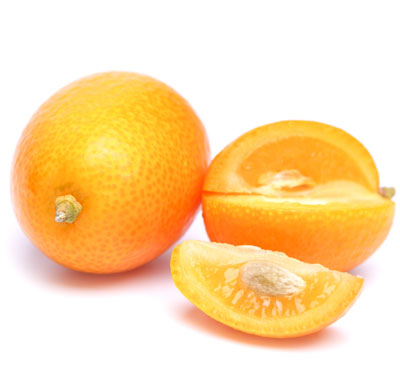





1. Kumquat Facts
2. Types of Kumquats
3. Nutritional Value of Kumquat
4. Health Benefits of Kumquats
Kumquats (sometimes spelled cumquat in Australian English and British English), are a group of small, angiosperm, fruit-bearing trees in the family Rutaceae. Their taxonomy is disputed. They were previously classified as forming the now-historical genus Fortunella or placed within Citrus, sensu lato. Different classifications have alternatively assigned them to anywhere from a single species, Citrus japonica, to numerous species representing each cultivar. Recent genomic analysis defines three pure species, Citrus hindsii, C. margarita and C. crassifolia, with C. × japonica being a hybrid of the last two.
The edible fruit closely resembles the orange (Citrus x sinensis) in colour, texture, and anatomy, but is much smaller, being approximately the size of a large olive. The kumquat is a fairly cold-hardy citrus.
History and Origin
Kumquats originated in Southeast China and were first documented there in the 12th century, later spreading to other parts of Asia and being introduced to Europe in 1846 by a Scottish botanist. The name comes from the Cantonese term "kam-kwat," meaning "golden orange". From China, they travelled to Japan and other regions before reaching the Americas and Australia in the mid-19th century.
Fruit ” Kumquat ” ( Nutritional value )
Nutritional value per 100 g
Kumquats, raw
|
Nutrient ( Proximate’s )
|
Unit
|
Value
|
Daily Value %
|
|
Energy
|
kcal
|
71
|
3.5%
|
|
Protein
|
g
|
1.88
|
3.7%
|
|
Total lipid (fat)
|
g
|
0.86
|
1.1%
|
|
Carbohydrate, by difference
|
g
|
15.90
|
5.7%
|
|
Fiber, total dietary
|
g
|
6.5
|
23.2%
|
|
Sugars, total
|
g
|
9.36
|
|
|
Minerals
|
|||
|
Calcium, Ca
|
mg
|
62
|
4.7%
|
|
Iron, Fe
|
mg
|
0.86
|
4.7%
|
|
Magnesium, Mg
|
mg
|
20
|
4.7%
|
|
Phosphorus, P
|
mg
|
19
|
1.5%
|
|
Potassium, K
|
mg
|
186
|
3.9%
|
|
Sodium, Na
|
mg
|
10
|
0.4%
|
|
Zinc, Zn
|
mg
|
0.17
|
1.5%
|
|
Copper, Cu
|
mg
|
0.095
|
10.5%
|
|
Manganese, Mn
|
mg
|
0.135
|
5.8%
|
|
Selenium, Se
|
mcg
|
0.0
|
|
|
Vitamins
|
|||
|
Vitamin C, total ascorbic acid
|
mg
|
43.9
|
48.7%
|
|
Thiamin (B-1)
|
mg
|
0.037
|
3.0%
|
|
Riboflavin (B-2)
|
mg
|
0.090
|
6.9%
|
|
Niacin (B-3)
|
mg
|
0.429
|
2.6%
|
|
Pantothenic acid (B-5)
|
mg
|
0.036
|
0.7%
|
|
Vitamin B-6
|
mg
|
0.036
|
2.1%
|
|
Vitamin B-12
|
mg
|
0.00
|
|
|
Folate DFE (dietary folate) (B-9)
|
mcg
|
17
|
4.2%
|
|
Vitamin A, RAE (retinol)
|
mcg
|
15
|
1.6%
|
|
Vitamin E (alpha-tocopherol)
|
mg
|
0.15
|
1%
|
|
Vitamin D (D2 + D3)
|
mcg
|
0
|
|
|
Vitamin K (phylloquinone)
|
mcg
|
0.0
|
|
|
Lipids
|
|||
|
Saturated Fatty Acids
|
g
|
0.103
|
0.5%
|
|
Monounsaturated Fatty Acids
|
g
|
0.154
|
|
|
Polyunsaturated Fatty Acids
|
g
|
0.171
|
|
|
Trans Fatty Acids
|
g
|
0.000
|
|
|
Carotenoids
|
|||
|
Beta-Alpha
|
mcg
|
155
|
|
|
Beta-Cryptoxanthin
|
mcg
|
193
|
|
|
Lutein + zeaxanthin
|
mcg
|
129
|
|

|
Reference Values are based on a 2,000 Calorie Intake, for Adults and Children 4 or More Years of Age. Your daily values may be higher or lower depending on your calorie needs.
|
|
Percentages are roughly approximated using (RDA) Recommended Dietary Allowances for adults. Source: Nutrient Database – USDA (United States Department of Agriculture)
|
|
Reference Values for Nutrition – FDA U.S. Food and Drug Administration
|
Kumquat Nutritional Value
Kumquats provide numerous health benefits due to their rich content of vitamins, fiber, and antioxidants. They support the immune system, promote healthy digestion, aid in skin health, and may contribute to overall cellular and bone health. Their low calorie count also makes them a good choice for a healthy snack.
- PROMOTES BONE HEALTH
Kumquats are a good source of calcium and also contain other nutrients like vitamin C and manganese that support bone health. While calcium is a key component of bones, vitamin C is essential for collagen production, and manganese plays a role in bone formation. - AIDS DIGESTION
Kumquats aid digestion primarily due to their high fiber content, which promotes regular bowel movements and helps prevent issues like constipation, bloating, and gas. They also contain antioxidants and flavonoids that may support overall digestive health, and traditional medicine notes their use for indigestion. - SUPPORTS EYE HEALTH
Kumquats support eye health due to their high levels of vitamin A, beta-carotene, and other antioxidants. These nutrients are crucial for vision, particularly in low light, and can help protect against damage, reduce the risk of cataracts, and prevent conditions like night blindness. - SOOTHES RESPIRATORY ISSUES
Kumquats can help soothe respiratory issues due to their high vitamin C content, which supports the immune system, and their traditional use in Chinese medicine for alleviating coughs and clearing phlegm. They may also act as an astringent to calm inflammation and are often combined with honey in teas for a sore throat remedy.

- BOOSTS IMMUNE SYSTEM
Kumquats boost the immune system primarily due to their high vitamin C content, a potent antioxidant that helps support the body's defences against infections. They also contain other antioxidants like flavonoids and may help activate immune cells like natural killer cells. - HELPS WITH WEIGHT MANAGEMENT
Kumquats can help with weight management due to their high fiber, water content, and low calories, which promotes fullness and reduces snacking. They also contain antioxidants and other nutrients that may further support a healthy metabolism and body composition. - RICH IN ANTIOXIDANTS
Kumquats are rich in antioxidants, including flavonoids, carotenoids, and vitamin C, which help protect cells from damage, reduce inflammation, and support immune and skin health. These compounds, especially abundant in the peel, contribute to their overall health benefits, which also include good sources of fiber and calcium. - SUPPORTS SKIN HEALTH
Kumquats support skin health because they are rich in antioxidants like Vitamin C, which help protect against damage, boost collagen production, and brighten the complexion. Their anti-inflammatory properties can also help soothe irritated skin, and they support hydration, keeping the skin supple.
References
Nutrient Database – USDA (United States Department of Agriculture)
Reference Values for Nutrition – FDA U.S. Food and Drug Administration
Boosts immune system - Yes, kumquats boost the immune system primarily due to their high vitamin C content, a potent antioxidant that helps support the body's defences against infections. They also contain other antioxidants like flavonoids and may help activate immune cells like natural killer cells.
Aids digestion - Kumquats aid digestion primarily due to their high fiber content, which promotes regular bowel movements and helps prevent issues like constipation, bloating, and gas. They also contain antioxidants and flavonoids that may support overall digestive health, and traditional medicine notes their use for indigestion.
Rich in antioxidants - Yes, kumquats are rich in antioxidants, including flavonoids, carotenoids, and vitamin C, which help protect cells from damage, reduce inflammation, and support immune and skin health. These compounds, especially abundant in the peel, contribute to their overall health benefits, which also include good sources of fiber and calcium.
Supports skin health - Yes, kumquats support skin health because they are rich in antioxidants like Vitamin C, which help protect against damage, boost collagen production, and brighten the complexion. Their anti-inflammatory properties can also help soothe irritated skin, and they support hydration, keeping the skin supple.
Promotes bone health - Kumquats promote bone health primarily because they are a good source of calcium and also contain other nutrients like vitamin C and manganese that support bone health. While calcium is a key component of bones, vitamin C is essential for collagen production, and manganese plays a role in bone formation.
Soothes respiratory issues - Kumquats can help soothe respiratory issues due to their high vitamin C content, which supports the immune system, and their traditional use in Chinese medicine for alleviating coughs and clearing phlegm. They may also act as an astringent to calm inflammation and are often combined with honey in teas for a sore throat remedy.
Helps with weight management - Yes, kumquats can help with weight management due to their high fiber, water content, and low calories, which promotes fullness and reduces snacking. They also contain antioxidants and other nutrients that may further support a healthy metabolism and body composition.
Supports eye health - Kumquats support eye health due to their high levels of vitamin A, beta-carotene, and other antioxidants. These nutrients are crucial for vision, particularly in low light, and can help protect against damage, reduce the risk of cataracts, and prevent conditions like night blindness.
